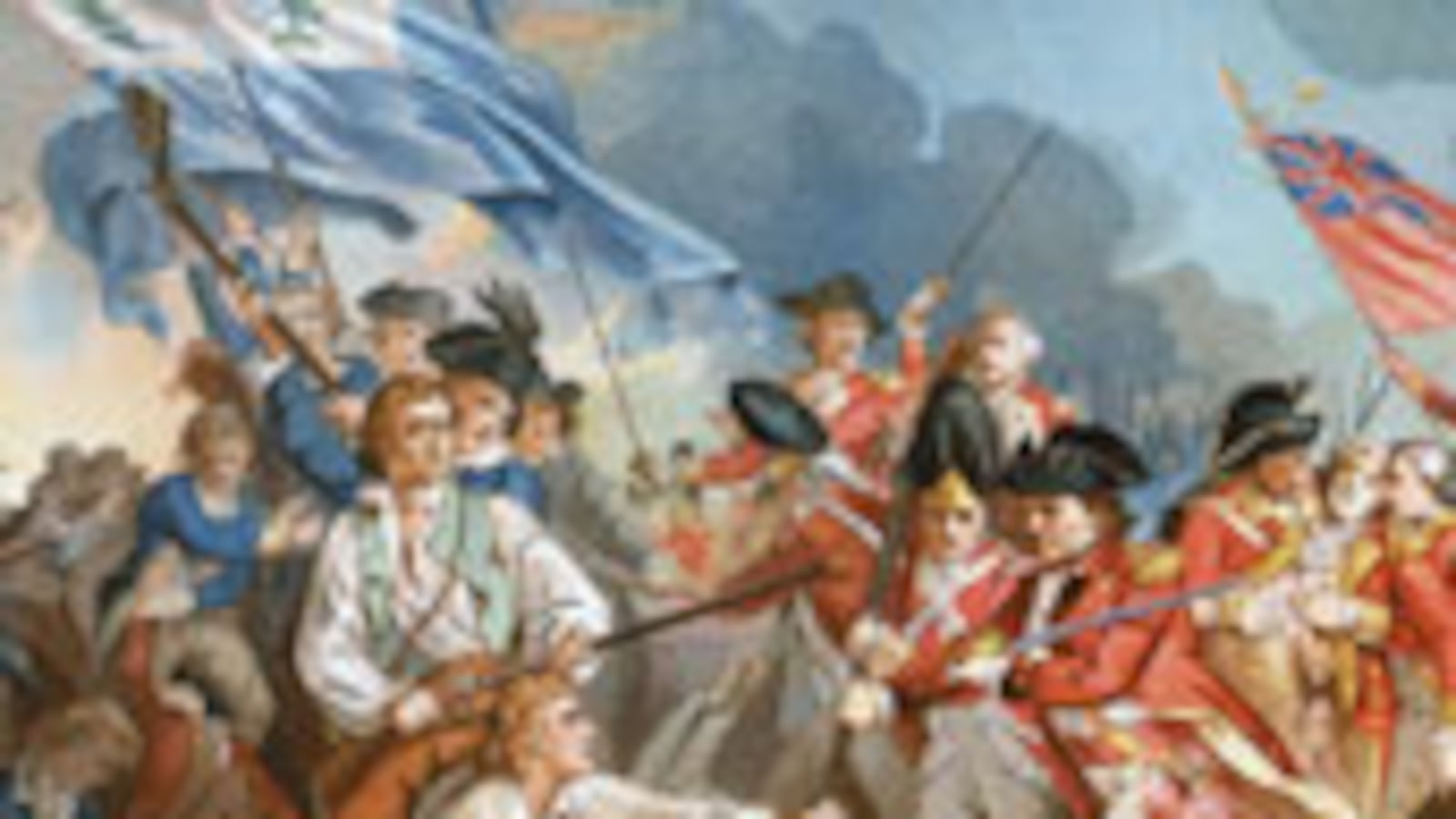
Independence Day typically focuses attention on a cast of characters known as the Founding Fathers. Curiosity about these leaders—George Washington, John Adams, and Thomas Jefferson, to name only the most famous—seems insatiable. The details of their lives assures us that once at the dawn of our shared political culture America’s national leaders were men of special talent, reasonable and intellectual figures who brought forth a new republic.
What we might ask is missing from this familiar narrative of the American Revolution? The answer, of course, is the ordinary people who sacrificed so much to achieve independence. It detracts nothing from the brilliance of the fifty-six members of the Continental Congress to acknowledge that they would constitute little more than a distinguished debating society absent tens of thousands of colonists willing to risk everything for the Cause of America. Reducing these ordinary Americans to silent spectators in the history of the events that we commemorate on July 4th is unjust. Worse, it obscures what we are commemorating.
“It was enough if he could at his Death see his Country Free, and it was a Pleasure to Die for the Rights of this People rather than submit to the cruel Hand of Tyranny.”
During the two years before the delegates to the Continental Congress issued a formal Declaration of Independence, ordinary Americans launched an insurgency that energized resistance to British rule. They drove the revolution forward, often staking out positions more radical than those of their leaders. Before the Congress convened (September 5, 1774), they had driven Imperial officials from office, formed associations of resistance, policed neighborhoods for dissent, even fielded in New England an impromptu army estimated at 20,000 men in response to a rumored bombing of Boston. Because they engaged in violence, they may make modern Americans uneasy. But whatever one thinks about the messy business of waging revolution, we should not forget that without the insurgency of ordinary people, we would not today be celebrating our independence.

Even those who favor a more expansive view of our revolutionary history sometimes question whether surviving records allow us to reconstruct the lives of the ordinary people. This is not a serious challenge. These men and women have always been hiding in plain sight. For more than two centuries they have waited for us to hear their story. They left diaries and letters; they voiced their political goals in newspaper articles. They recorded the actions of revolutionary committees of safety. These materials open a window onto the experiences of obscure Americans who decided around family dinner tables, in churches and town meetings, that they could no longer endure an oppressive imperial government.
Two examples immediately come to mind. Matthew Patten owned a hardscrabble farm in Bedford, New Hampshire. What distinguished him from his neighbors was his marvelous diary that chronicled how he and the members of his family were drawn—slowly, often reluctantly—into the resistance movement. His reflections remind us how revolutions transform local communities. On the day that the inhabitants of Bedford learned that British forces had shot farmers in Lexington, Massachusetts—people much like the Pattens—Matthew noted a flurry of activity. His son John and forty four men marched in support of the Americans. Matthew’s daughters also responded to the revolutionary moment. “Our Girls sit up all night baking bread and fitting things for him [John].” The boy received a serious wound at Bunker Hill, but no sooner had he recovered than he rejoined the Continental forces. He was killed early in 1776.
• Sean Wilentz: July 4th’s Forgotten Partisan HistoryMatthew’s diary recorded a parent’s pain. John, the father explained, died “defending the just Rights of America to whose end he came in the prime of life by means of that wicked Tyrannical Brute (nea worse than Brute) of Great Britain. He was Twenty four years and 31 days old.” The Pattens did not need the Declaration of Independence to tell them about the American Cause.
Nor did Samuel Thompson require the Founding Fathers to explain why ordinary Americans had to defend their rights against a despotic parliament. Like Matthew Patten, Thompson was a struggling farmer. During the spring of 1775, he organized his neighbors into an insurgent group, and wearing only sprigs of spruce in their hats, they attempted to seize a British warship, thus sparking what is know locally as “Thompson’s War.” Later, he pledged to the Americans serving under him in the Continental Army “I never will forsake you.” One person noted that Thompson assured the soldiers, “It was enough if he could at his Death see his Country Free, and it was a Pleasure to Die for the Rights of this People rather than submit to the cruel Hand of Tyranny.”
Commemorating people like Thompson allows us properly to acknowledge and celebrate our shared popular political culture. Colonists like the Pattens did not fight against imperial rule because they resented paying taxes. The problem was taxes without representation. They understood that resistance to the state must be based on more than unhappiness over a particular law or self-interest. The Reverend Nathaniel Niles, staunch supporter of the Cause of America, reminded the members of his congregation in Newburyport, Massachusetts, “The true spirit of a mob consists in unconstitutional violence, done with a design to bring about some private end.” That, Niles underscored, was the antithesis of what animated American’s colonial insurgents. The Reverend Nathan Fiske echoed these sentiments. “When people oppose the authority of their rulers, it is generally called insurrection and rebellion.” For Fiske, resisting “arbitrary rulers” was one thing, while engaging in “lawless riots” that had the capacity to become “tyrannical, imperious, and oppressive” quite another.
Americans certainly wanted nothing of mob rule. Locally elected committees of safety drew thousands of ordinary men into revolutionary politics. Most had never held office before 1774. From Georgia to New Hampshire these schools of revolution filled a vacuum created by the sudden collapse of British authority outside the major ports. The committees boldly experimented with participatory forms of government at the local level. By carrying out the mandates of Congress within communities, they provided ordinary people throughout America with the experience of republican rule. The committees successfully balanced the need to expose ideological enemies against the threat of wanton bloodshed that might have sparked a bitter counter-insurgency.
The ordinary people who resisted the British Empire spoke for the common good; they reached out to distant strangers, creating broad political solidarities. Samuel Thompson and Matthew Patten were not political theorists in the way our Founding Fathers indisputably were. They likely did not read Locke or Montesquieu. And while they may not have perceived resistance in intellectual terms, they brought a key element to the revolutionary equation. They infused abstract ideas about rights and liberty with passion: fear, anger, a desire for revenge, and a sense of betrayal. Without such emotion, they would never have sacrificed so much in the cause of independence. We owe it to them to understand how they came to believe—in the words of Thomas Paine—"The sun never shined on a cause of greater worth….’Tis not the concern of a day, a year, or an age; posterity are virtually involved in the contest, and will be more or less affected, even to the end of time, by the proceedings now.”






